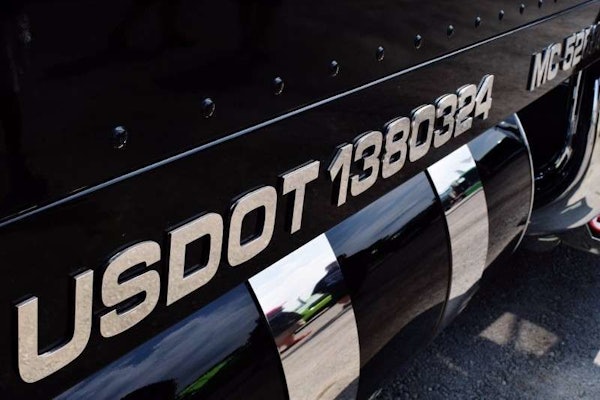Kevin Storm sits in the driver’s seat of his armored Mercedes rig. Storm, whose handle is “Joker,” drove a convoy in Iraq from October 2004 to November 2005 and went back for another year this past June.
Many truckers say they love the freedom and adventure of the road. But the placid highways of the United States weren’t enough for Kevin Storm. He wanted to go where the action was, so he signed up for not just one but two yearlong contracts to drive in war-torn Iraq.
At age 35, Storm has been a disc jockey, a college student, a hash slinger at Huddle House, a trucker and a soldier in the United States Army. As a company driver for six years, he drove a flatbed for Werner Enterprises, a truck for Sherwin-Williams and hauled Mercedes-Benzes for Centurion Auto Transport.
But now he has a much more dangerous and lucrative job on his resume – driving a truck in Iraq for KBR Transport, a subsidiary of the military contractor Halliburton.
Storm says he was first enticed to go to Iraq because of the different viewpoints he heard from friends and the news. “I always have to see things for myself,” he says.
His ex-wife Sondra agrees. The two were still together when Storm left for Iraq the first time. “It was very, very emotional, but I was not about to stand in his way,” she says. “For as long as I’ve known Kevin, he has just needed to do things for himself. It’s not something macho or ego-driven in any way.”
Storm’s desire to see the war firsthand has put him face to face with both the thrilling and the disturbing. He says in his first year in Iraq, he was impacted by the way people would swarm around the convoy when it pulled into its destination. He grows quiet as he tells the story of four other drivers who got killed after their convoy accidentally turned down a dead-end street.
Numerous civilian truckers have died since the United States invaded Iraq in April 2003. Nevertheless, Storm says he is ready for his second round, which began in June.
He spent his first 14 months in Iraq, from October 2004 to November 2005, driving a Mercedes rig with a European transmission, a truck he describes as “fantastic to drive.” Sent to haul fuel, he ended up pulling a 10,000-gallon water tank. “It doesn’t go boom, but the insurgents know that water is perhaps more important than fuel,” he says.
Often driving the lead truck in the convoy, Storm’s responsibilities include not only driving but also conveying the convoy commander and making sure drivers of other vehicles get out of the way while the convoy passes down the center of the road. He says he is sometimes forced to get entirely in the left lane to make those drivers get at least two wheels off the road, keeping them from making any drastic movements to threaten the trucks.
Storm is knowledgeable on the topic of combat and defense. Tall with an athletic build and a shaved head, he says he has been informally teaching hand-to-hand combat for 15 years, what he calls “a nasty mix of Bruce Lee, Tony Blauer stuff and Israeli knife fighting.” He says he even taught the members of the 101st Airborne and a group of soldiers in his spare time.
“Everything for me is athletic in one way or another,” he says. Because of this, his biggest fear is not dying but losing a limb. He says one day he looked at the armor covering his head and chest and realized, “They’re protecting all the wrong stuff.”
Of his second year in Iraq, Storm says, “This time I’ll probably be gone for good.”
That doesn’t mean he has any plans to die. He says he wants to stay overseas and possibly start doing business in Dubai, one of the major cities in the United Arab Emirates. He is also thinking about moving to the Philippines. “For me, being in the States is like going to a family reunion – it’s good to see everyone, but soon you’re ready to get out of there.”
Sondra says her pride in Storm outweighs the pain of watching him leave a second time. “I have no fears whatsoever,” she says. “I feel he will succeed in whatever he puts his mind to. Talking him out of something like this is not an option; that would just take away from his spirit, and he needs encouragement and support.”
Sondra says she hopes driving in the convoy will help Storm get his foot in the door for bigger and better opportunities, such as working in security.
For his return trip to Iraq, Storm doesn’t foresee many changes. He expects to work the same minimum 12-hour days in similar conditions. “It’s definitely not going to let up. That’s the battleground of the war on terrorism. That’s the focal point.
“The chaos has become a little more organized,” he says. “It’s become more bureaucratic, and that makes it difficult to be there sometimes. When you come back from convoying, the last thing you want is some safety guy or security guy in your face.”
But the camaraderie among the soldiers and drivers and the fact that he knows he is doing something necessary make the job worthwhile. He was also impressed by the professionalism of the young soldiers there. Storm spent a month and a half at Camp Victory in Baghdad, where he saw them hold their fire in many situations when they could have simply shot suspicious people.
One of the things Storm is not concerned with is the money. “The money seems to be a big item of interest,” he says. “But the only way you’re making $100,000 is earning every penny of it, driving long convoys everyday. Typically, guys make upward of $80,000, and considering what they have to deal with, that’s chump change.”
Storm says truck drivers who are thinking about going to Iraq should ask themselves if they could deal with what might happen in the worst-case scenario.
“Here, we’re so comfortable and protected,” he says. “It’s there that you get to know what somebody’s made of.”
–Brittani Tingle






